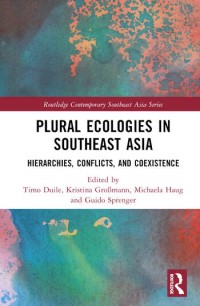Ecological disturbances: Negotiating indigeneity and access to land in Indonesia
 Associate Professor Birgit Bräuchler has contributed the chapter ‘Ecological disturbances: Negotiating indigeneity and access to land in Indonesia’ to the book Plural Ecologies in Southeast Asia: Hierarchies, Conflicts, and Coexistence, edited by Timo Duile, Kristina Großmann, Michaela Haug and Guido Sprenger.
Associate Professor Birgit Bräuchler has contributed the chapter ‘Ecological disturbances: Negotiating indigeneity and access to land in Indonesia’ to the book Plural Ecologies in Southeast Asia: Hierarchies, Conflicts, and Coexistence, edited by Timo Duile, Kristina Großmann, Michaela Haug and Guido Sprenger.
The book draws on ethnographic studies in Southeast Asia to provide new insights into human–environmental relationships and ecologies, together with a set of theoretical innovations. Contextualizing ecologies in this region as pluralizing or hegemonic, conflictive or cooperative, the case studies in the book’s chapters bring into dialogue ontological approaches, the issue of distinct worldviews and concepts of nature on the one hand and political ecology and power relations on the other. Southeast Asia is one of the most biodiverse and culturally diverse regions in the world. Thus, what occurs in this region is vitally important to the future of Earth.
Birgit Bräuchler’s chapter is about diverging land claims in Indonesia. Indonesia’s current president Joko Widodo wants to develop Indonesia from its margins, with mixed results so far. One target area for capitalist investment are the Aru Islands in Maluku Province, Eastern Indonesia. Such investment plans rarely cater for cultural needs or analyse their social compatibility. Governments, investors and local population groups invoke diverging ecologies. Government and investors argue that nature must be adapted to the economic needs of the islands’ inhabitants so that the area can finally prosper.
For people indigenous to the area societal relations and cultural meanings are more important; for them, such capitalist intrusions cause the disturbance of an ecological balance that is deeply ingrained in the cultural and societal set-up of indigenous livelihoods. Given existing power relations in Indonesian politics and the weak legal standing of indigenous people, such clashes are often reduced to a hegemonic state against oppressed marginalised people, which overlooks or ignores power struggles and divergent interpretations within the respective parties. The chapter focuses on these tensions within the Aruese adat community and follows the pluralisation and diversification of indigenous ecologies in response to outside interventions that threaten to drive a wedge between those supporting and those resisting the investment plans.
Read more about the book on the publisher, Routledge’s website: Plural Ecologies in Southeast Asia Hierarchies, Conflicts, and Coexistence.
